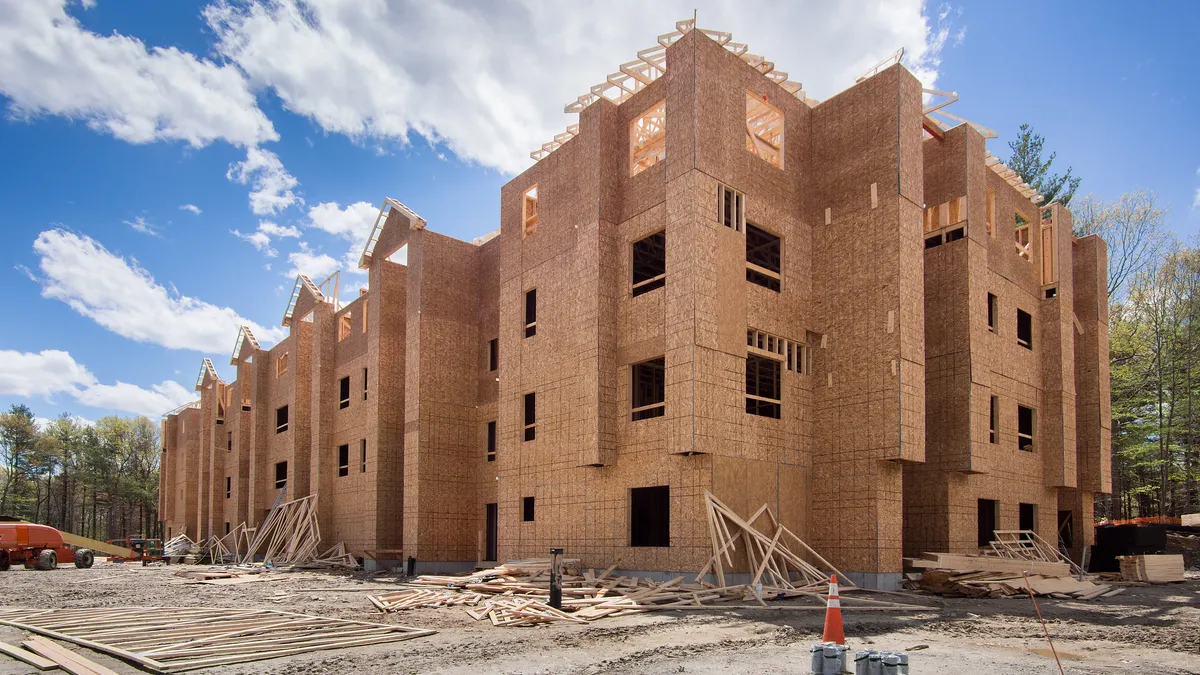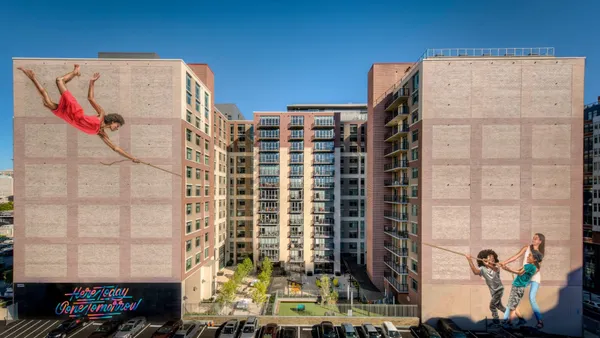With President-elect Donald Trump returning for his second term in the White House, the nation’s multifamily pros are set to experience a stark shift in federal priorities and policies that will affect the way they do business.
In terms of a plan for housing, the key points in Trump’s housing plan, according to the National Apartment Association, include:
- Reducing mortgage rates, lowering inflation and opening federal land to new home construction.
- Tax incentives and support for first-time buyers.
- Cuts to housing regulations, which would make housing less expensive to build.
- A ban on mortgages for undocumented immigrants.
Efforts to reduce regulation could make it easier for builders to add homes at lower price points, said Realtor.com Chief Economist Danielle Hale in a release shared with Multifamily Dive. Expanded supply could also come from making federal lands available for housing development, an idea that Trump discussed while campaigning.
“Together, these ideas could help builders make headway on the housing shortage that has largely only widened over the last decade,” Hale said.
Trump could also potentially roll out more tax-haven development zones, akin to the Opportunity Zones he debuted in his first term, according to Ralph McLaughlin, senior economist at Realtor.com.
“I wouldn't be surprised if Trump were to renew such efforts, which certainly would spur renewed interest in the multifamily sector,” McLaughlin told Multifamily Dive.
The Biden administration’s housing actions included efforts to establish a national cap on rent increases, strengthen renter protections and restrict junk fees. The president-elect has not addressed these plans in his housing policy, and their status in the next administration is unknown.
Other policies
Trump has blamed immigration for rising housing prices, and has spoken of conducting a mass deportation of undocumented immigrants. The incoming administration claims this move would reduce demand and upward pressure on housing costs, according to NPR.
However, economists told NPR that immigration actually has a very small effect on housing costs, and that a mass deportation would remove many workers from the construction labor pool, making new housing more expensive to build.
Other Trump policies could also make building new apartments more expensive, such as new tariffs on imported materials that would lead to higher material costs, said Michael Guckes, chief economist at Cincinnati-based ConstructConnect.
“Certain proposed policies risk triggering higher construction costs,” said Guckes. “New tariffs on imported construction goods, which would raise the price of these goods, may lead to a second spell of construction inflation.”
Chris Gower, CEO of Edmonton, Alberta-based contractor PCL Construction, whose U.S. headquarters are in Denver, said his firm is keeping a close track on how these potential policy changes will unfold.
“The things that Trump will do and has promised to do can hurt us and help us,” said Gower. “I’m not sure today, without knowing how those plans are going to unfold, if it’s neutral, or if it’s positive or negative. We’re looking at it from a number of fronts and we’re tracking how it’s going to impact us in more detail.”
Industry reaction
Sharon Wilson Géno, president of the National Multifamily Housing Council, told Multifamily Dive that the organization expects significant housing policy action over the next several years across all levels of government.
“There is now an opportunity for lawmakers in both parties to develop a housing policy framework that is better coordinated among all levels of government to expand housing supply and opportunity while lowering costs,” Wilson Géno said. “Given the number of very closely contested races, lawmakers should be incentivized to focus on enacting bipartisan, common sense housing solutions.”
The NAA also stated that it welcomed the opportunity to work with the administration to develop housing policy solutions.
“This election made clear that housing is top of mind for voters throughout our country, and it’s past time to come together and meaningfully address longstanding housing affordability challenges,” Bob Pinnegar, president and CEO of the NAA, told Multifamily Dive.
Congressional outlook
With Tuesday’s election, Republicans will take a majority in the Senate next year, which will mean a change in leadership in several key committees for housing policy, according to the NAA.
As of publication time, control of the U.S. House of Representatives has not been decided, with many races still ongoing, according to the Associated Press. This leaves leadership of the House’s key housing-related committees up in the air, according to the NAA.
“Results for the House of Representatives are yet to be determined, but a Republican sweep is possible, which could enable the incoming administration to move quickly on priorities,” Hale said.
Sebastian Obando contributed to this report.










